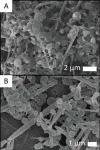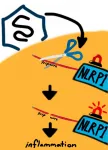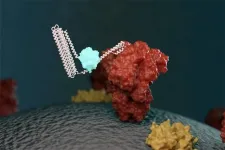Working in a mouse model, Rachel Schroeder, a student in the UI Interdisciplinary Graduate Program in Neuroscience, drew a connection between the work of her two mentors, Hanna Stevens, MD, PhD, UI associate professor of psychiatry and Ida P. Haller Chair of Child and Adolescent Psychiatry, and Andrew A. Pieper, MD, PhD, a former UI faculty member, now Morley-Mather Chair of Neuropsychiatry at Case Western Reserve University and Investigator and Director of the Neurotherapeutics Center at the Harrington Discovery Institute, University Hospitals Cleveland Medical Center.
Stevens's lab studies the long-lasting impact of stress during pregnancy, which can lead to neuropsychiatric impairment in offspring during early life and in adulthood. Pieper's lab focuses on discovery of neuroprotective treatments, exemplified by the pharmacologic agent used here, known as P7C3-A20, which has previously been shown to protect the adult brain from injury.
Schroeder spent time in both labs early in her graduate school career and was inspired to bring the two lines of research together in her own work, investigating the potential impact that P7C3-A20 might have in protecting the embryonic brain during adverse events in pregnancy. Her work is the first to explore the therapeutic potential of prenatal exposure to P7C3 compounds.
"Prenatal stress increases the risk for offspring to have neurodevelopmental problems," Schroeder said. "We wanted to know whether the P7C3-A20 compound protected the embryonic brain from damage. Our results show that offspring are protected from the negative effects of stress when the mothers are treated with P7C3-A20 during the same time."
The research was published online this week in the journal Antioxidants & Redox Signaling.
Previous work by Pieper's lab has shown that P7C3-A20 enables nerve cells to maintain normal levels of an energy molecule known as nicotinamide adenine dinucleotide (NAD+), under toxic or injury conditions that are otherwise overwhelming and energy-depleting for the cell.
Schroeder's research showed that chronic prenatal stress in mice disrupted the embryonic brain's NAD+-synthesis machinery, which led to degeneration of nerve cell axons, learning deficits, and depression-like behavior when the offspring reached adulthood. Schroeder demonstrated that when prenatally-stressed pregnant mice were simultaneously treated with P7C3-A20, their offspring were protected from these negative effects.
"By stabilizing critical NAD+-producing mechanisms, we enabled the developing embryonic brain to continue developing normally despite the stress," Schroeder said.
"Though there are many challenges associated with administering medicines during pregnancy, Rachel Schroeder's discovery represents an exciting move forward in understanding how prenatal stress harms the brain, and strategies for protecting the developing embryo," said Pieper, who is also a psychiatrist at the Louis Stokes VA Medical Center in Cleveland.
This study represents an important proof of concept for a new approach to early prevention of neuropsychiatric problems, Stevens said. "Neuropsychiatric problems are the most common chronic illnesses of young people, which means we need many more ways to protect the brain as it develops. Our lab is focused on mechanisms of brain development prenatally, a critical time when we could make a difference."
INFORMATION:
In addition to Schroeder, Pieper and Stevens, the research team included Lynn Nguyen and Alexandra Loren in the Stevens Lab at the UI; Preethy Sridharan, Coral J. Cintrón-Pérez, and Edwin Vázquez-Rosa in the Pieper Lab at the Harrington Discovery Institute; and Noelle S. Williams and Kavitha P. Kettimuthu at the University of Texas Southwestern Medical Center.
Funding was provided by the Brockman Foundation, the Elizabeth Ring Mather & William Gwinn Mather Fund, S. Livingston Samuel Mather Trust, G.R. Lincoln Family Foundation, Wick Foundation, Gordon & Evie Safran, the Leonard Krieger Fund of the Cleveland Foundation, the Maxine and Lester Stoller Parkinson's Research Fund, the Louis Stokes VA Medical Center resources and facilities, Project 19PABH134580006-AHA/Allen Initiative in Brain Health and Cognitive Impairment, a Junior Research Program of Excellence from the Roy J. Carver Charitable Trust, Nellie Ball Trust, the National Institute for Mental Health, UI Environmental Health Science Research Center, and the UI Graduate College.
About University of Iowa Health Care
University of Iowa Health Care is the state's only comprehensive academic medical center, dedicated to providing world-class health care and health-related outreach services to all Iowans. Based in Iowa City, UI Health Care includes University of Iowa Hospitals & Clinics, University of Iowa Roy J. and Lucille A. Carver College of Medicine, and University of Iowa Physicians, the state's most comprehensive multi-specialty physician group practice.
About Harrington Discovery Institute
The Harrington Discovery Institute at University Hospitals in Cleveland, OH--part of The Harrington Project for Discovery & Development--aims to advance medicine and society by enabling our nation's most inventive scientists to turn their discoveries into medicines that improve human health. The institute was created in 2012 with a $50 million founding gift from the Harrington family and instantiates the commitment they share with University Hospitals to a Vision for a 'Better World'. For more information, visit: HarringtonDiscovery.org.
About University Hospitals / Cleveland, Ohio
Founded in 1866, University Hospitals serves the needs of patients through an integrated network of 19 hospitals, more than 50 health centers and outpatient facilities, and 200 physician offices in 16 counties throughout northern Ohio. The system's flagship academic medical center, University Hospitals Cleveland Medical Center, located in Cleveland's University Circle, is affiliated with Case Western Reserve University School of Medicine. The main campus also includes University Hospitals Rainbow Babies & Children's Hospital, ranked among the top children's hospitals in the nation; University Hospitals MacDonald Women's Hospital, Ohio's only hospital for women; University Hospitals Harrington Heart & Vascular Institute, a high-volume national referral center for complex cardiovascular procedures; and University Hospitals Seidman Cancer Center, part of the NCI-designated Case Comprehensive Cancer Center. UH is home to some of the most prestigious clinical and research programs in the nation, including cancer, pediatrics, women's health, orthopedics, radiology, neuroscience, cardiology and cardiovascular surgery, digestive health, transplantation and urology. UH Cleveland Medical Center is perennially among the highest performers in national ranking surveys, including "America's Best Hospitals" from U.S. News & World Report. UH is also home to Harrington Discovery Institute at University Hospitals - part of The Harrington Project for Discovery & Development. UH is one of the largest employers in Northeast Ohio with 28,000 physicians and employees. Advancing the Science of Health and the Art of Compassion is UH's vision for benefitting its patients into the future, and the organization's unwavering mission is To Heal. To Teach. To Discover. Follow UH on LinkedIn, Facebook @UniversityHospitals and Twitter @UHhospitals. For more information, visit UHhospitals.org.
Case Western Reserve University is one of the country's leading private research institutions. Located in Cleveland, we offer a unique combination of forward-thinking educational opportunities in an inspiring cultural setting. Our leading-edge faculty engage in teaching and research in a collaborative, hands-on environment. Our nationally recognized programs include arts and sciences, dental medicine, engineering, law, management, medicine, nursing and social work. About 5,100 undergraduate and 6,700 graduate students comprise our student body. Visit case.edu to see how Case Western Reserve thinks beyond the possible.
Louis Stokes Cleveland VA Medical Center is the hub of VA Northeast Ohio Healthcare System, providing and coordinating primary, acute and specialty care. Focusing on treating the whole Veteran through health promotion and disease prevention, VA Northeast Ohio Healthcare System delivers comprehensive, seamless health care and social services for more than 112,000 Veterans at 18 locations across Northeast Ohio. VA Northeast Ohio Healthcare System contributes to the future of medicine through education, training and research programs. For more information visit http://www.cleveland.va.gov.




